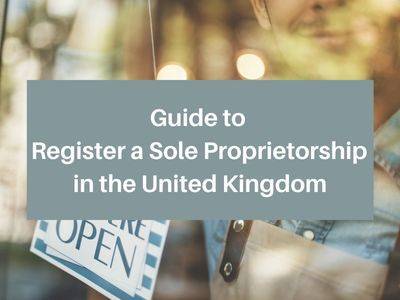Guide to Register a Sole Proprietorship in the United Kingdom

In the United Kingdom, almost three-quarters of all businesses consist of sole traders. Also known as sole proprietorships, this type of enterprise is usually favoured by entrepreneurs who want full control over the company. It is one of the easiest business structures to set up and requires very little in terms of compliance. In this guide to register a sole proprietorship in the United Kingdom, we cover all the salient points.
Going Solo
A defining criterion of sole proprietorships is that there is no separation between the owner and the business entity. This is due to the process of registering the company. Businesses that are registered with Companies House, such as limited companies, acquire a separate legal entity status upon incorporation.
On the other hand, a sole proprietorship is not a company but is legally an individual carrying on a business. There is no incorporation process, hence no creation of a separate legal identity for the business. All liabilities, debts and risk are borne by the sole trader. Conversely, you don’t need to share the profits or the decision-making process with anyone.
In fact, the sole trader is only required to register for self-assessment tax with HMRC. Upon completion of registration, HMRC will issue a Unique Tax Reference (UTR). No other certificate or document will be issued acknowledging the status of a sole proprietorship. Aside from informing HMRC, a sole proprietorship will need to have a National Insurance (NI) number if you don’t already have one.
A sole trader also has the option of trading under their own name or choosing a business name. If you decide to choose a business name, you must follow the United Kingdom Government’s naming rules. These can be a bit complex and best started with a company name search and a trademark search. Generally, you will not be able to take a name that is already in use by another business. There are also various rules on the usage of symbols, signs and marks as well as unique names.
As a sole proprietor, you will own your whole business and can’t have shareholders or partners. However, that does not mean you are a one-person show as you can hire as many employees as you require. You will also have to file the self-assessment forms and pay a 20% tax on all profits that you make.
If your business is in the construction industry, then registering with the Construction Industry Scheme as a contractor or sub-contractor is required. Other matters to consider include registering for value-added tax (VAT) where necessary. This will arise if your business has reached the VAT threshold.
As this guide to register a sole proprietorship in the United Kingdom shows, there are few compliance and registration rules to follow. However, a professional touch does make a difference when it comes to setting up shop. Company formation firms such as 3E Accounting offer customisable solutions that will ensure you meet all necessary compliance. We can even help you design and host your business website and take care of all audits.
Contact 3E Accounting today to work with industry professionals who know precisely what your business needs to succeed.

